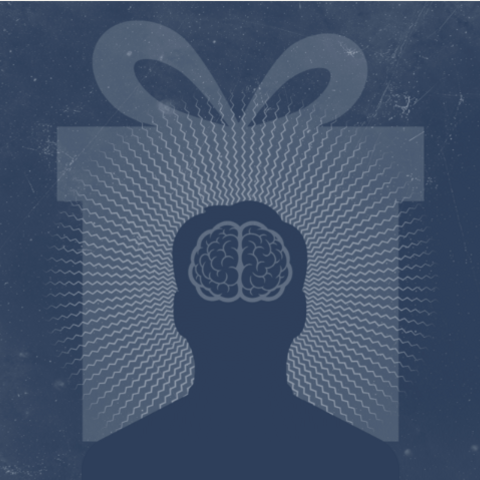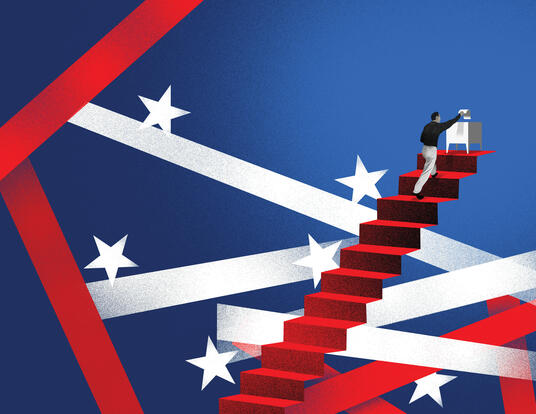Sickness and Social Outcomes
Kacie Dragan, PhD ’24
Research at Risk: Since World War II, universities have worked with the federal government to create an innovation ecosystem that has yielded life-changing progress. Now much of that work may be halted as funding is withdrawn. Find out more about the threats to medical, engineering, and scientific research, as well as how Harvard is fighting to preserve this work—and the University's core values.
Kacie Dragan recently graduated from the Harvard Kenneth C. Griffin Graduate School of Arts and Sciences (Harvard Griffin GSAS) with a PhD in health policy. She discusses how getting sick can impact housing and social welfare, ways to improve resilience in the face of health emergencies, and her path from ballerina to scholar.
Health Events and Housing
There’s a lot of research on how social determinants like income, education, or housing affect health. I study these topics but also look at how housing, homelessness, and child welfare are affected when people get sick. My goal is to understand what matters the most in preventing negative outcomes and to work with policymakers to improve people’s circumstances after a major health event.
When people experience a major health event—even when insured—it could precipitate negative social outcomes. They might lose their job. They might lose social support. They might become homeless. Additionally, if someone receives low-quality care, it makes it even more likely that a health event could push them into homelessness or unstable housing. On the other hand, some existing social policies help insulate a person from the negative social impact of getting sick. For example, people who have access to public or subsidized housing have more protection against homelessness after a health event than people who don’t.
Most of my research focuses on people insured by Medicaid. They tend to be low-income and don’t pay much out-of-pocket for healthcare compared to the general population. Medical debt is a problem for many Americans, but my work shows that health events can cause a cascade of troubles even when people have comprehensive insurance. I use data from healthcare claims of Medicaid recipients in New York State and combine that with residential addresses to follow what happens to an individual’s housing situation after a health event. While my work is largely quantitative and anonymized, it’s informed by qualitative research and by conversations with low-income patients and the physicians and social service professionals who work with them.
I’ve identified some promising areas for improving people’s resilience in the face of health emergencies. For example, access to subsidized housing and high-quality healthcare seem to be two important factors. I am especially optimistic about medical-legal partnerships in healthcare organizations. In these programs, patients are offered free assistance to navigate legal challenges that may arise or worsen during a health event. This can include assistance dealing with threats of eviction or job termination, information about their rights, or legal protections like paid sick leave. Low-income groups also often only have access to the lowest-quality hospitals. My findings show that this inequity has consequences in other domains of people’s lives, like housing. This information makes improving the quality of healthcare for low-income populations even more urgent.
Dance Academy
Before I started my career in academia, I trained to be a professional ballerina. I went to Walnut Hill School, a performing arts high school known for ballet. A lot of my classmates became very successful dancers. In fact, many of them are now retiring, while I am just starting my professional academic career!
At Walnut Hill, there was an elective course for students who wanted to teach dance. I was one of the only ones who took it because not many high school students wanted to work with three-year-olds. It was so rewarding to educate people about something I was interested in that I went on to teach at a daycare center during my first year of college. These experiences got me thinking about how I could serve students directly while also finding a way to work on a policy level to address some of the challenges in their lives. That was when I started down an academic path to my policy-focused PhD; I still get to engage with students while also working on pressing policy questions.
Now that I’ve got my PhD, I can see that ballet and academia are quite similar in some ways. There is an element of perfectionism. You’re always polishing and performing. You’re always “auditioning,” always applying yourself, always trying to get a grant or a fellowship. Both fields are very competitive. I think a lot of the survival skills I learned as a ballerina—like how to take constructive criticism, how to be creative but disciplined, and how to bring together many individuals to create something special as a collective unit—have served me well in the world of academia.
This research was funded by the National Institutes of Health, and the Agency for Healthcare Research and Quality.
Get the Latest Updates
Join Our Newsletter
Subscribe to Colloquy Podcast
Simplecast





